|
|
|
Sort Order |
|
|
|
Items / Page
|
|
|
|
|
|
|
| Srl | Item |
| 1 |
ID:
090287
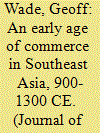

|
|
|
|
|
| Publication |
2009.
|
| Summary/Abstract |
One of the most influential ideas in Southeast Asian history in recent decades has been Anthony Reid's Age of Commerce thesis, which sees a commercial boom and the emergence of port cities as hubs of commerce over the fifteenth to seventeenth centuries, which in turn spurred political, social and economic changes throughout the region. But how new were the changes described in Reid's Age of Commerce? This paper argues that the four centuries from circa 900 to 1300 CE can be seen as an 'Early Age of Commerce' in Southeast Asia. During this period, a number of commercial and financial changes in China, South Asia, the Middle East and within the Southeast Asian region, greatly promoted maritime trade, which induced the emergence of new ports and urban centres, the movement of administrative capitals toward the coast, population expansion, increased maritime links between societies, the expansion of Theravada Buddhism and Islam, increased monetisation, new industries, new forms of consumption and new mercantile organisations. It is thus proposed that the period from 900 to 1300 be considered the Early Age of Commerce in Southeast Asian history.
|
|
|
|
|
|
|
|
|
|
|
|
|
|
|
|
| 2 |
ID:
085471
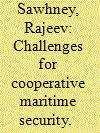

|
|
|
|
|
| Publication |
2008.
|
| Summary/Abstract |
Globalization has enhanced the interdependent between nations. Considering the critical nature of global maritime trade, ensuring safe for uninterrupted maritime commerce is in the common interest. As maritime threats have become transnational, tackling them requires coordinates maritime response at global level. Recognition within a region of the existence of a common threat is a pre - requisite for participating nations to accept the need for a cooperative security structure.
|
|
|
|
|
|
|
|
|
|
|
|
|
|
|
|
| 3 |
ID:
154586
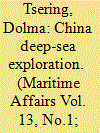

|
|
|
|
|
| Summary/Abstract |
In the last few decades, given China's growing dependency on the maritime realm, it has shifted its focus from securing borders to the pursuit of national maritime interests. China is overly dependent on the seas for maritime trade, secure energy supply, access to marine resources and access to the resources outside its borders. In this context, deep-sea exploration and capacity building emerge as important indicators of China's growing dependency on and interest in the maritime domain. Beijing's interest in deep-sea exploration and capacity building includes underwater resource exploitation, developing new technology and infrastructure related to deep-sea exploration, and maritime security. Given that China's deep-sea exploration is enmeshed with its larger geostrategic interests outside its borders, it raises a series of concerns for states in its neighbourhood. The military application of these deep-sea technologies is of greatest concern, besides power projection in the regional security domain. This paper seeks to study China's deep-sea exploration and capacity building in the context of technology and infrastructure. The paper covers contested intentions behind China's deep-sea exploration and the implications as well as concerns for China's neighbouring countries.
|
|
|
|
|
|
|
|
|
|
|
|
|
|
|
|
| 4 |
ID:
130062
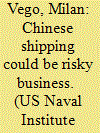

|
|
|
|
|
| Publication |
2014.
|
| Summary/Abstract |
Although their economy is increasingly dependent on maritime trade, China lacks the ability to protect its shipping-a dangerous reality should they find themselves in a major war at sea.
China's greatest strength is at the same time its greatest weakness. With the second largest global economy, about 60?70 percent of China's economic activity today is directly or indirectly linked to trade with other nations. 1 In 2011 85 percent of China's total trade was by sea. 2 In this regard, the country is increasingly dependent on maritime trade-and the security of its sea lanes-for its economic vitality, high standard of living, and military strength.
|
|
|
|
|
|
|
|
|
|
|
|
|
|
|
|
| 5 |
ID:
124286
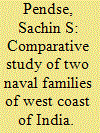

|
|
|
|
|
| Publication |
2013.
|
| Summary/Abstract |
Indian have always been known to have had maritime intercource extending beyond the countries of Persian Gulf and the Red sea. India had trading relations with the Phoenicians, Jews, Assyrians, Greeks, Egyptians and Romans.
|
|
|
|
|
|
|
|
|
|
|
|
|
|
|
|
| 6 |
ID:
081224
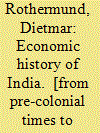

|
|
|
|
|
| Publication |
New Delhi, Manohar, 1989.
|
| Description |
214p.hbk
|
| Standard Number |
8185054525
|
|
|
|
|
|
|
|
|
|
|
|
Copies: C:1/I:0,R:0,Q:0
Circulation
| Accession# | Call# | Current Location | Status | Policy | Location |
| 044077 | 954/ROT 044077 | Main | On Shelf | General | |
|
|
|
|
| 7 |
ID:
146866
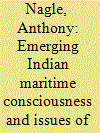

|
|
|
| 8 |
ID:
150436
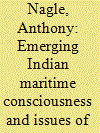

|
|
|
| 9 |
ID:
091516
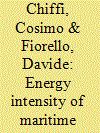

|
|
|
|
|
| Publication |
2009.
|
| Summary/Abstract |
This paper describes the energy consumption performance of sea-going ships engaged in the EU27 seaborne trades based on data and parameters resulting from the EX-TREMIS (EXploring non road TRansport EMISsions in Europe) database. EX-TREMIS is a comprehensive database of fleet and transport activity data, specific energy consumption, emission factors and total emissions from rail, maritime and air transport in the European Union. The EX-TREMIS maritime model derives from a mixture of top-down and bottom-up approaches for estimating pollutant emissions from shipping activities. The model did not use direct observations of actual trips, but empirically derived the number of equivalent-ships. Cargo type shipments were linked to seven ship type categories for which a further segmentation by ship size (three length classes), type and age of the main engine and type of fuel was applied.
|
|
|
|
|
|
|
|
|
|
|
|
|
|
|
|
| 10 |
ID:
157467
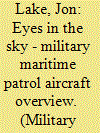

|
|
|
| 11 |
ID:
120888
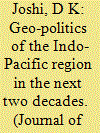

|
|
|
| 12 |
ID:
162738
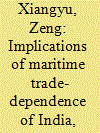

|
|
|
|
|
| Summary/Abstract |
India, China and Japan, the economic big three in Asia, is heavily dependent on maritime trade in terms of importation of energy and other natural resources in addition to import/export of manufactured products. Major economic, political and security impact has been resulted from such a dependence, as the sea-lines of communication for maritime trade across the Indian Ocean and West Pacific is vulnerable to heavy conventional/unconventional threat. Policy measures have been taken in order to mitigate the vulnerabilities. Accelerated development of maritime powers, bilateralism/multilateralism, enhanced engagement with regional players and diversification policies are among such effort. The unconventional challenges are on the decline, partly thanks to effective counter-measures, while the conventional challenges is on the rise, also partly due to the mis-match of policies from major stakeholders. The Rise of Indo-Pacific Concept and the Emerging Maritime Regionalism can be a double-edge sword. Clarification of strategic intention and effective policy dialogue is needed for a more harmonious maritime engagement among the three. Strategic vision and smart policies are needed to ensure a cooperation for the benefit of all stakeholder inclusive of the three countries in particular.
|
|
|
|
|
|
|
|
|
|
|
|
|
|
|
|
| 13 |
ID:
118894


|
|
|
| 14 |
ID:
185768
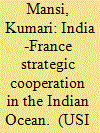

|
|
|
|
|
| Summary/Abstract |
Even before the ‘Indo-Pacific’ narrative, the Indian Ocean has been historically a theatre of human interaction via maritime trade and a pivot of great power rivalry. The strategic location and economic potential of IOR makes it a volatile and troublesome region in the world. The emerging power dynamics in the region and contestation of power, resources, and dominance among the key players of the region— the US, China, Japan, Australia, India, and France, makes this area a dangerous conflict zone. The IOR (IOR) figures prominently in the strategic outlook of India and France who happen to be the main players of this region amid the growing footprint of China in the region. The strategic partnership has now been expanded to include the IOR, and both countries recognise the critical role they can play in maintaining regional peace, security, and stability. The increasing cooperation in the Indian Ocean is a step closer to the convergence in their respective policy towards Indo-Pacific.
|
|
|
|
|
|
|
|
|
|
|
|
|
|
|
|
| 15 |
ID:
142126
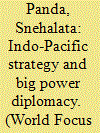

|
|
|
|
|
| Summary/Abstract |
India’s presence in the IO is limited though it has numerous trade routes favouring maritime trade for a number of countries. But over the years it is used in a manner adversarial to India’s interests. China has connected with more littorals in the Ocean and cautioned India against considering it as its “backyard”. Chinese sources deny its expansionist objective in the IOR. But India should not be complacent, rather it should improve its activities in the region for ensuring stability in the environment to expedite socio economic development.
|
|
|
|
|
|
|
|
|
|
|
|
|
|
|
|
| 16 |
ID:
072788
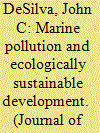

|
|
|
| 17 |
ID:
098924
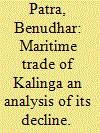

|
|
|
| 18 |
ID:
138025
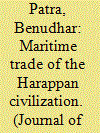

|
|
|
| 19 |
ID:
162739
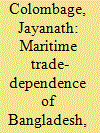

|
|
|
|
|
| Summary/Abstract |
Maritime trade is a key contributor to economy in many countries particularly those that are bordering on oceans. Sri Lanka is geographically located in proximity to the main East-West sea route creating multiple logistics advantages to the adjunct countries. This paper considers the maritime trade dependence between Bangladesh, Myanmar and Sri Lanka that focuses on potential implications and a futuristic view. The paper primarily provides an appraisal of maritime trade about Bangladesh, Myanmar, and Sri Lanka. Thereafter, it identifies the historical connections between these countries and discusses the related developments and implications in the maritime industry. It consists of a review and comparison of shipping performance of the countries and an appraisal of Logistics Performance. In addition, it provides an indication of the global perception about other key factors pertaining to logistics and transport. Port project developments, One Belt One Road Initiative, maritime security, risk of Cyber-attacks, a rule based maritime order, trade and investment, transport, energy, and tourism are other factors that are highlighted in this paper.
|
|
|
|
|
|
|
|
|
|
|
|
|
|
|
|
| 20 |
ID:
077567
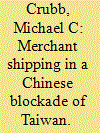

|
|
|
|
|
|
|
|